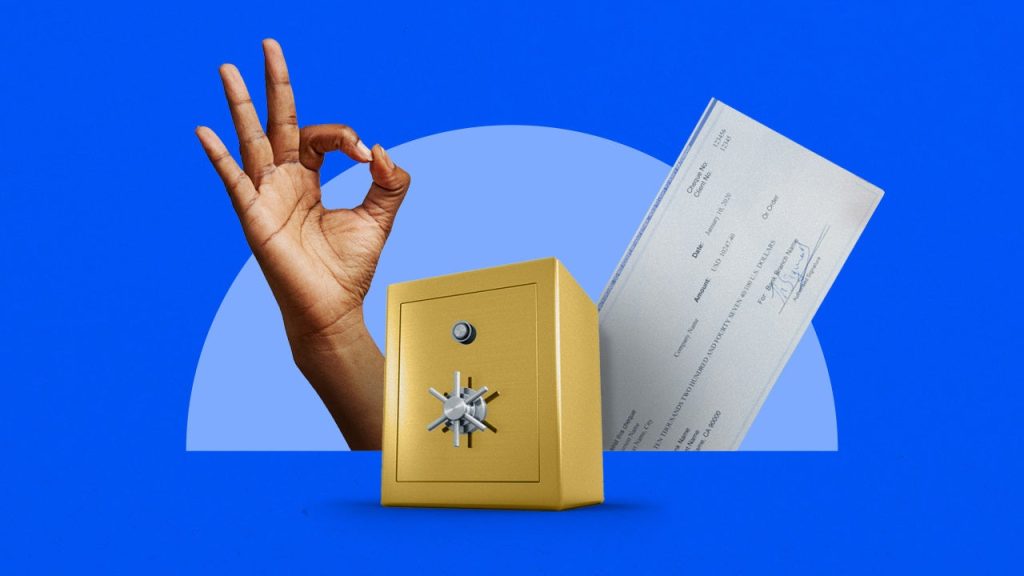For workers who are used to receiving their paycheck every other week, the calendar is aligned in May to give some biweekly wage earners “bonus” third paychecks during the year. For 2025, the bonus months are either January and August (if the first paycheck is paid on Jan. 3), or May and October (if the first paycheck is paid on Jan. 10).
Having an extra paycheck in a month can really help if you’re living paycheck to paycheck. It can provide the financial means to help you establish, or add to:
And in some instances, you’ll want to apply this extra paycheck towards multiple financial goals.
Say, for example, you earn $5,000 of income after taxes and withholding each month — paid bi-weekly — and after you’ve paid all of your monthly expenses, you have $100 remaining. But in a month when you receive a third paycheck, you’d have an extra $2,600.
What you can do with that bonus paycheck is ultimately up to you and your financial needs. But if you’re looking for ideas to bolster your financial bottom line, here are Bankrate’s five wise ways to put that extra paycheck to good use.
1. Start, or add to, an emergency fund
An emergency fund can help you pay for unexpected costs that come your way, such as car repairs or medical bills. However, only 41 percent of Americans would use their savings to pay for an unplanned expense of $1,000, according to Bankrate’s latest Emergency Savings Report, for which a survey was conducted in December 2024.
If you’re low on emergency savings, it can pay to deposit the money from an extra paycheck into a high-yield savings account. In addition to providing a financial cushion, money in a savings account also earns interest. For example, $1,000 in a high-yield savings account with an annual percentage yield (APY) of 4.30 percent would earn around $43 in interest over a year.
In the months you don’t receive an extra check, you can also try to save a little at a time, perhaps through a split direct deposit whereby your employer deposits a portion of your paycheck into a savings account via direct deposit.
Bankrate’s take: It’s advisable to have upwards of six months’ worth of expenses saved in an emergency fund. But the more money saved, the better. For those who are starting an emergency fund, let Bankrate’s emergency fund primer guide you to building your rainy-day fund.
2. Pay off high-interest debt
Almost half of credit cardholders in the U.S. report carrying a balance, according to Bankrate’s recent Credit Card Debt Survey. While the average credit card interest rate has been decreasing, annual percentage rates (APRs) are expected to remain pricey in 2025.
For example, in one year, it would cost you $111 in interest to pay off a $1,000 balance on a credit card at a 20 percent APR.
Extra money from a third monthly paycheck could be used to pay down high-interest credit card debt more quickly. In turn, this can help free up money for other purposes such as adding to savings, paying down a mortgage or decreasing student loan debt.
3. Contribute more to a retirement account
Generally, you’re able to adjust the amount you contribute to a retirement account. Some people might want to increase their contribution percentage to a 401(k) during a month with an extra paycheck.
This could be a temporary increase, if your employer allows this. It could be even better for your retirement savings if you’re able to use this extra money to permanently increase your 401(k) contribution for the year, using the extra paycheck to help pay for expenses throughout the year.
If, for example, your annual salary is $100,000, and you’re paid every other week, a six percent contribution to your 401(k) would be around $231 per paycheck. Increasing your contribution to eight percent would be around $308. So, the extra paycheck could cover that $154 monthly increase in your monthly 401(k) contribution, during a regular two-paycheck month, if you’re paid every other week.
You could also contribute money to an IRA or an IRA CD, though the latter option might not be appropriate for people many years away from retirement age.
4. Save for upcoming large expenses
You might decide to devote some or all of a third monthly paycheck to it, if you know you’ll be faced with a significant expense in upcoming weeks or months. Examples include a new appliance, repairs to your home’s roof or an upcoming medical expense not covered by insurance. Devoting the extra paycheck to such purposes can be a relatively easy way to have some money on hand when it’s needed in the future.
Other examples of upcoming large expenses can include property taxes and car insurance, which are commonly due quarterly or biannually. While it’s important to set aside money regularly for such expenses, an extra paycheck can provide a lifeline if you’ve fallen behind on saving for them.
5. Put the money toward other goals
Let’s say you’re not in credit card debt, and you have money set aside for emergencies and other planned expenses. In this case, you might consider saving a third monthly paycheck toward other goals you have in mind. Perhaps it could fund your upcoming holiday shopping, or you could set it aside for a vacation you’ve been planning.
When saving extra paychecks or other such windfalls for specific purposes, it can be challenging to keep the windfall money separate from funds set aside for other purposes. One solution can be a savings account — such as that from Ally Bank — that allows you to separate your money into different categories or buckets. Similarly, Alliant Credit Union provides the option of using up to 19 “supplemental” savings accounts for different purposes, each of which can be named for its goal.
Using accounts that make it easy to categorize your savings can make it easier to stay on track when you’re saving for multiple things at once. It can also help keep you from dipping into money for emergencies to fund other purchases.
What are the three-paycheck months in 2025?
Those paid on a bi-weekly basis will have a three-paycheck month based on their first paycheck of the year.
| First paycheck | First three-paycheck date | Second three-paycheck date |
|---|---|---|
| Jan. 3, 2025 | Jan. 31, 2025 | Aug. 29, 2025 |
| Jan. 10, 2025 | May 30, 2025 | Oct. 31, 2025 |
People paid weekly have five-paycheck months in January, May, August and October in 2025.
How budgeting can help you maximize the benefit of an extra paycheck
Budgeting can help you prepare for an irregular payment, be it a tax bill or an insurance payment. You can project when you’ll be billed for such expenses, and the approximate amount, though sometimes increases can be unpredictable.
Even if you can’t divert the whole paycheck right away … over the course of the next month or so you should be able to transfer that entire amount toward a productive use like debt repayment or increasing savings.
— Greg McBride, CFA | Bankrate Chief Financial Analyst
Your extra paycheck could be larger if your employer has a benefit that’s deducted from your paycheck only twice a month, says Chris Snyder, director of eastern SMB operations at Paychex, a provider of payroll services.
“It really depends on how the employer wants to set up that deduction for that particular benefit that they’re offering their employee,” Snyder says.
Put your extra paycheck in a high-yield savings account at an online-only bank
Savings accounts offered at big, traditional banks generally don’t offer competitive yields. The national average yield for savings accounts is currently around eight times lower than what you can earn from top-yielding savings accounts.
That’s why it’s worth considering allocating a portion of an extra paycheck to a high-yield savings account. Compare banks to find the right one for you.
Opening a high-yield savings account can work together with several of the strategies above. And make sure to go with an account that won’t have you paying fees, which could eat into your interest earnings. It’s easy to find an account with a high yield and without monthly service fees at some top FDIC-insured online-only banks.
Money tip: Now that you’ve decided to put that extra paycheck to good use, let Bankrate’s savings goal calculator help you crunch the numbers to meet your savings objectives.
Bottom line
A month with an extra paycheck can be a game-changer for your finances. Generally, there are only a couple of times a year when you’ll earn more money than usual in a month — so consider making the most of this financial opportunity, be it by building an emergency fund, paying off high-interest debt, contributing to a retirement account, divvying up the extra money to last you throughout the year, or saving it to pay for large, irregularly-timed payments.
Read the full article here












